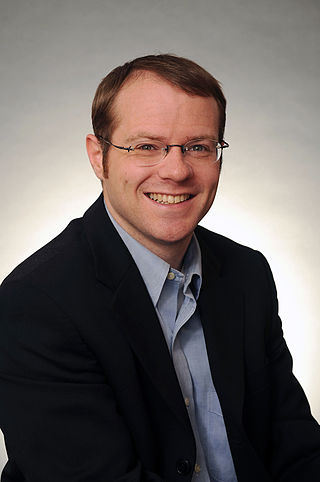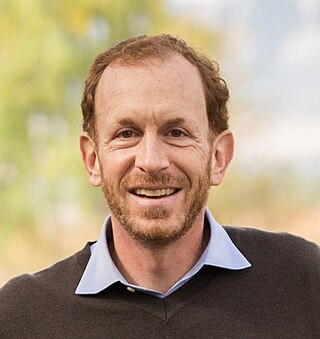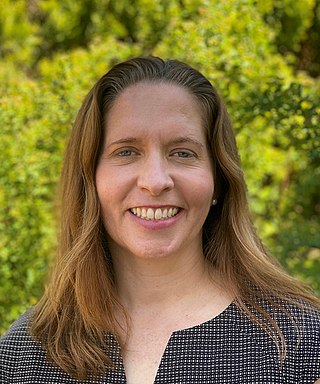
Food miles is the distance food is transported from the time of its making until it reaches the consumer. Food miles are one factor used when testing the environmental impact of food, such as the carbon footprint of the food.

Joseph J. Romm is an American researcher, author, editor, physicist and climate expert, who advocates reducing greenhouse gas emissions to limit global warming and increasing energy security through energy efficiency and green energy technologies. Romm is a Fellow of the American Association for the Advancement of Science. In 2009, Rolling Stone magazine named Romm to its list of "100 People Who Are Changing America", and Time magazine named him one of its "Heroes of the Environment (2009)", calling him "The Web's most influential climate-change blogger".

Rafael Luis Bras is a Puerto Rican civil engineer best known for his contributions in surface hydrology and hydrometeorology, including his work in soil-vegetation-atmosphere system modeling.

The President's Council of Advisors on Science and Technology (PCAST) is a council, chartered in each administration with a broad mandate to advise the president of the United States on science and technology. The current PCAST was established by Executive Order 13226 on September 30, 2001, by George W. Bush, was re-chartered by Barack Obama's April 21, 2010, Executive Order 13539, by Donald Trump's October 22, 2019, Executive Order 13895, and by Joe Biden's February 1, 2021, Executive Order 14007.
The Ivan Allen College of Liberal Arts is a college of the Georgia Institute of Technology, a public research university in Atlanta, Georgia. It is one of the six academic units at the university and named for former two-term Atlanta mayor Ivan Allen Jr., a Georgia Tech alumnus and advocate for the advancement of civil rights in America.

Energy and American Society: Thirteen Myths is a 2007 book about energy security and climate change, edited by Benjamin K. Sovacool and Marilyn A. Brown. The book is suitable for both technical and non-technical audiences since it is written in plain English and is "easily digested by anyone with a rudimentary background or interest in energy economics".
Carbon lock-in refers to the self-perpetuating inertia created by large fossil fuel-based energy systems that inhibits public and private efforts to introduce alternative energy technologies. Related to the concept of technological lock-in, the concept is most used in relation to the challenge of altering the current energy infrastructure to respond to global climate change.

The Dirty Energy Dilemma: What’s Blocking Clean Power in the United States is a 2008 book by academic Benjamin K. Sovacool, published by Praeger. In the book, Sovacool explores problems with the current U.S. electricity system and ways to overcome them.

Benjamin K. Sovacool is an American academic who is director of the Institute for Global Sustainability at Boston University as well as Professor of Earth and Environment at Boston University. He was formerly Director of the Danish Center for Energy Technology at the Department of Business Development and Technology and a professor of social sciences at Aarhus University. He is also professor of energy policy at the University of Sussex, where he formerly directed the Center on Innovation and Energy Demand and the Sussex Energy Group. He has written on energy policy, environmental issues, and science and technology policy. Sovacool is also the editor-in-chief of Energy Research & Social Science.

The G. Wayne Clough Undergraduate Learning Commons, commonly referred to by its acronym CULC, is an academic building on the main campus of the Georgia Institute of Technology. The five-story, 220,000 sq ft (20,000 m2) building houses classrooms, science laboratories, academic services, commons areas, and is managed by and connected to the Georgia Tech Library. Named in honor of President Emeritus G. Wayne Clough, the Clough Commons cost $85 million and opened in the fall of 2011.
Energy efficiency gap refers to the improvement potential of energy efficiency or the difference between the cost-minimizing level of energy efficiency and the level of energy efficiency actually realized. It has attracted considerable attention among energy policy analysts, because its existence suggests that society has forgone cost-effective investments in energy efficiency, even though they could significantly reduce energy consumption at low cost. This term was first "coined" by Eric Hirst and Marilyn Brown in a paper entitled "Closing the Efficiency Gap: Barriers to the Efficient Use of Energy" in 1990.
Kristin Shrader-Frechette is O'Neill Family Professor, Department of Biological Sciences and Department of Philosophy, at the University of Notre Dame. She has previously held senior professorships at the University of California and the University of Florida. Most of Shrader-Frechette's research work analyzes the ethical problems in risk assessment, public health, or environmental justice - especially those related to radiological, ecological, and energy-related risks. Shrader-Frechette has received the Global Citizenship Award, and the Catholic Digest named her one of 12 "Heroes for the US and the World".

Climate Change and Global Energy Security: Technology and Policy Options is a 2011 book by Marilyn A. Brown and Benjamin K. Sovacool, in which the authors offer detailed assessments of commercially available technologies for strengthening global energy security and climate change mitigation. They also evaluate the barriers to the deployment of these technologies and critically review public policy options for their commercialization. Arguing that society has all the technologies necessary for the task, they discuss an array of options available today, including high-efficiency transportation, renewable energy, carbon sequestration, and demand side management.

Janelle Knox-Hayes is the Lister Brothers Associate Professor of Economic Geography in the Department of Urban Studies and Planning at the Massachusetts Institute of Technology. Her research and teaching explore the institutional nature of social, economic and environmental systems, and the ways in which these are impacted by changing socio-economic spatial and temporal dynamics.

The contributions of women in climate change have received increasing attention in the early 21st century. Feedback from women and the issues faced by women have been described as "imperative" by the United Nations and "critical" by the Population Reference Bureau. A report by the World Health Organization concluded that incorporating gender-based analysis would "provide more effective climate change mitigation and adaptation."

Reginald DesRoches is an American civil engineer who, as of July 1, 2022, serves as the president at Rice University. From 2020 until 2022, he served as provost of Rice. Earlier, beginning in 2017, he was the dean of engineering at Rice's school of engineering, and from 2012 to 2017, DesRoches held the Karen and John Huff Chair at the Georgia Institute of Technology.

Morgan D. Bazilian is an American-Irish academic, who has spent the majority of his career as a diplomat and in public service. He is the Director of the Payne Institute for Public Policy, and a professor of public policy at the Colorado School of Mines. His research focuses on energy and climate change policy, national security, and international affairs. In 2019, he was asked to testify in front of the U.S. Senate Committee on Energy and Natural Resources as an expert witness.
Kaye Husbands Fealing is an American economist who is Dean of the Ivan Allen College of Liberal Arts at Georgia Tech. She previously taught for 20 years at Williams College, served in several staff positions with the National Science Foundation, and chaired the School of Public Policy at Georgia Tech. She is a former president of the National Economic Association.
The Institute for Energy Efficiency (IEE) is a research institute of the University of California, Santa Barbara (UCSB). IEE is an interdisciplinary research institute dedicated to the development of science and technologies that increase energy efficiency, reduce energy consumption, and support an efficient and sustainable energy future.

Jennie C. Stephens is an academic researcher, professor, author, and social justice advocate. She is Professor of Sustainability Science & Policy at Northeastern University in Boston, Massachusetts. She is also affiliated with the Women's, Gender and Sexuality Studies Program, the department of Civil & Environmental Engineering and the department of Cultures, Societies & Global Studies.














